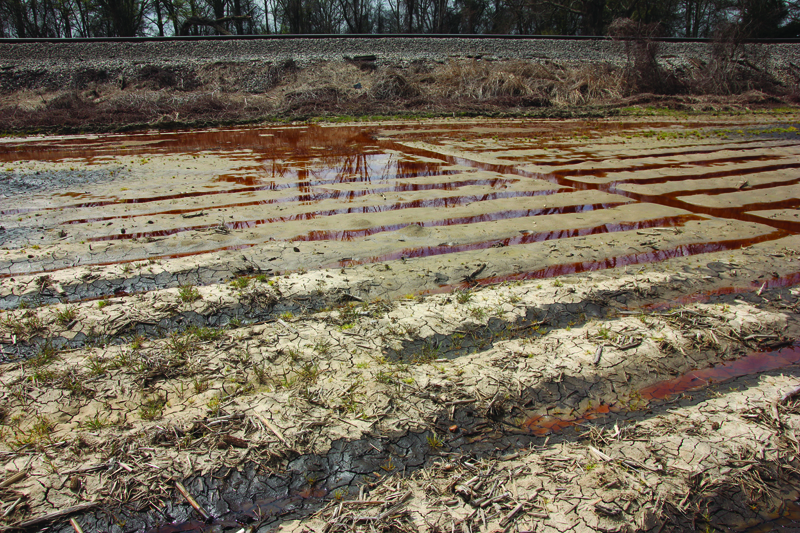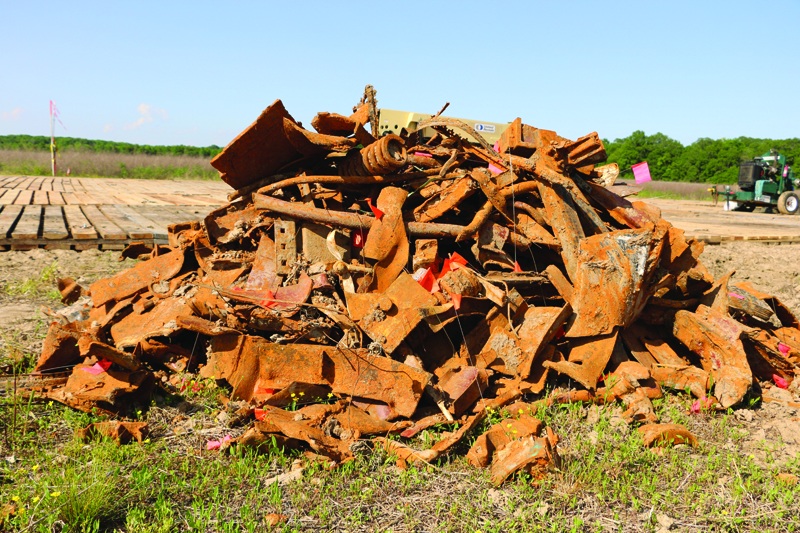Leflore County Farm Still Contaminated Eight Years After Event
By Becky Gillette
The February Norfolk Southern train derailment in East Palestine, Ohio, released hundreds of thousands of pounds of hazardous waste and focused nationwide attention on the health hazards associated with train derailments. At least twenty-five federal lawsuits have been filed against the company.
A Canadian National (CN) Railway/Illinois Central Railroad train derailment eight years ago on property owned by the Melton family has still not been remediated, says Floyd Melton III, who along with his brother, Moss Melton, and their father, Floyd Melton, Jr., practice at the Melton Law Firm in Greenwood. Melton III says they have been unable to plant crops, or be reimbursed for the crop losses during the past eight years when it has not been safe to grow crops on that land on their farm located twenty miles north of Greenwood in the northernmost portion of Leflore County.
“The East Palestine Norfolk Southern derailment was larger in scale based on the volume of chemicals and the number of people affected, but it has several of the same hallmarks as the CN derailment that occurred on our farm on March 30, 2015,” says Melton. “From what we have seen from the news reports, Norfolk Southern and CN appear to use the same playbook when it comes to dealing with the aftermath of a derailment.”
Melton says common tactics likely include preventable derailment likely caused by cost-cutting measures in maintenance, safety, and personnel; the top priority after disaster is to reopen tracks even when it causes further environmental, financial, and physical harm to surrounding people or property; lack of useful information provided by the railroad or its environmental contractors during the emergency phase further negatively affecting people and property; downplaying the severity of the disaster and its effects; and refusing to actively take responsibility (financial and environmental) for the damages caused.
Melton says that, as a result, they are still left with devastating contamination as well as literal tonnage of cut up train cars intentionally buried under their field by CN.
Melton says that CN has been using the Mississippi Department of Environmental Quality to allow CN to be negligent with the site cleanup process, and to delay the Melton’s lawsuit for losses from going forward. Melton says the federal court has prevented the lawsuit from proceeding until the Meltons have exhausted the family’s administrative remedies with MDEQ.



CN, a company with $17 billion in revenues in 2022, declined to comment on the Melton spill and cleanup.
Jan Schaefer, communications director for MDEQ, says corrective action, such as what is needed on the Melton’s farm, is often a lengthy process.
“For impacted landowners we understand it can be frustrating but, the heart of MDEQ’s mission is protecting human health and the environment,” says Schaefer. “MDEQ in its regulatory role and directed by its mission to protect human health and the environment oversees any responsible parties, in this case Illinois Central Railroad, in the remediation of the contamination. We do this in many ways and one of those is through remediation of contaminated sites. MDEQ also seeks and considers all input of those impacted as the remediation begins and progresses. Remediation of this site is ongoing and MDEQ will continue to provide considerable resources to ensure the site is sufficiently remediated.”
Melton says for two three-year periods in the past eight years, there has been no real mediation of the site done by CN. The Meltons allege MDEQ has not been concerned about how long the remediation takes and MDEQ has no ability to stop the financial losses that are continuing.
“We haven’t been able to plant there the past eight seasons,” says Melton. “We have zero income on 150 acres. From May 2015 until April 2018, CN didn’t do anything, and we kept asking for water testing. CN representatives kept telling us it was not in the water. It took CN six years to figure out where the contamination had spread. CN has not been totally truthful about what it was doing. It has been a slow play intentionally so we will quit, go away, die or go broke. Just like East Palestine, it is deliberate the way CN goes about evading responsibility.”
Recently the Meltons received surface water samples that CN took in November 2022.
“Two of the six surface water samples came back with detections of DCPD (Dicyclopentadiene) flowing in the ditch nearly eight years after CN spilled and covered up the chemical,” says Melton. “We also continue to receive monthly groundwater samples taken by CN that are well above the allowed amount for this hazardous waste.”
In December 2020, CN assured MDEQ and the federal court that the entire area would be cleaned up by October of this year. Melton says CN will not make that deadline and the Meltons are concerned that MDEQ may continue to allow CN to drag its feet in completing the hazardous waste cleanup.
“As long as MDEQ allows the continued lackluster effort, it appears that we will be prevented from going to court,” says Melton. “A trial by jury is the only way we see CN ever doing ‘what is right’. Even then if a jury does make them do right, they will likely appeal any decision to continue to delay, lie, cheat and steal.”
Melton says the spill on Melton’s land and the East Palestine spill have some similarities. One is the CEO saying repeatedly, including while testifying in the U.S. Congress recently, that they are “going to do the right thing.”
“I fully understand that and it means they are going to do the right thing for the railroad and no one else,” says Melton. “They have been doing ‘remediation’ since 2015. They made it worse rather than better. The groundwater has tested 8,000 times higher than allowed.”
Melton says he has a copy of CN’s emergency response plan, and what CN did was totally different. And some remediation in the last year has helped reduce levels of toxic chemicals but left really high PH and salt levels in the soil—both of which are bad for crops.
